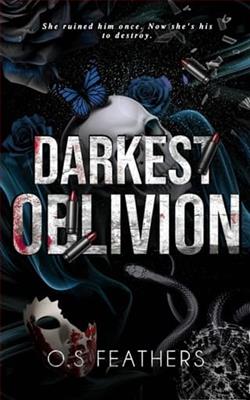Page 59 of A Boy Called Lovesong
Cybil wobbled her head, weighing up her conflicting advice. “True. Just don’t bruise it when you stab it. Okay?”
My back was aching, and the passenger seat with the broken springs wasn’t doing much for my ass either. “You do this every day?”
Cybil sat behind the wheel as she drove her bouncy old pickup between the cotton fields toward the crossroads. “Not every day. Only every second day or so. It ain’t so bad. Once I do the drop-off at the Landry factory, I get to spend the rest of my day in the general store. It’s nice and cool in there. It’s got a big ceiling fan that Earl installed last year.”
“Is it bigger than the little fan in his workshop, because all that did was blow hot air on my sweaty neck.” I glanced down at Chet sitting on my lap, hanging his tongue out the window as his nose wriggled at every scent he could smell in the cotton fields. “Do you ever get used to this heat?”
“Hell, I got nothin’ to complain about. It’s the cotton pickers who do all the real back-breaking work, out in the sun all day.”
She pointed out to the left as we came across them now, their huge, woven baskets slung over their shoulders, hands easing the cotton buds from their branches and putting the bushels in the baskets.
It was impossible not to spot Lovesong amongst them.
His skin was slick with sweat, shiny like a bronze statue in the rain.
His back muscles extended and contracted with automatic ease and grace, reaching, plucking, placing the bushels in the basket before repeating the motion over and over.
But it wasn’t simply the sight of him that made him easy to pick in the cotton field.
It was the sound of him.
Even from where I sat in the passing pickup, I could hear the lyrics he sang floating on the hot autumn breeze.
It was another Robert Johnson song—“Hell Hound on My Trail.”
As Lovesong sang, the other cotton pickers provided the harmonies and joined in the chorus. Not a single word, not a single note from the song distracted any of them from their work; I suppose it was the song that distracted them from the heat and baking sun. All the while, they remained focused on the task at hand, their eyes moving from one cotton bud to the next, except Lovesong who used his fingers to feel from one bushel and branch to another.
As we passed them by, I wondered again where Lovesong had disappeared to the night before.
In the next moment, the crossroads came into view up ahead, and suddenly I uttered, “Robert Johnson.”
Cybil glanced across to me. “You say something?”
I looked ahead at the intersection we came to. “These crossroads… Clara’s Crossing.” I paused a moment, not sure I wanted to ask my next question but not sure I could stop myself. “What happened here? You told me last night that the reverend’s wife found Lovesong here as a baby. But there’s more to it than that, isn’t there.”
Cybil began to brake, and Chet and I lurched forward. “What makes you think there’s more to the story than that?”
I looked warily down the criss-crossing roads. “Call it a hunch.”
Cybil put her indicator on—even though there were no other vehicles to indicate to—and hauled the steering wheel left. “You do realize that once you hear this story, you can’t unhear it.”
“You do realize you’re stalling. Please, just tell me the story.”
A rush of air escaped Cybil’s large chest. “Don’t say I didn’t warn you, and please don’t think I’m all Sodom and Gomorrah like the reverend. I’m just gonna tell you the only version of the story anyone’s ever known. If there’s another version, it’s yet to be heard.”
“I won’t judge. I promise.”
“I guess it all started with Harper and Hettie, almost thirty years ago now. They were two young girls who worked for the reverend and his wife. Harper Clementine was their maid, and Henrietta Jones was their cook. While Reverend Jim worked hard on his sermons and trying to keep the cotton pickers loyal to the Lord, his wife Adeline made certain Harper and Hettie kept an abundance of food on the table and the house pristine and clean. She refused to tolerate a single speck of dust in thehouse. If she did happen to wipe a ledge or run her finger over the piano to find even the most miniscule trace of dust, the reverend’s wife would inform her husband, who would call Harper into his study and dish out whatever punishment he deemed appropriate. After all, cleanliness is next to Godliness. Until…”
“Until what?”
“Until something… unclean… came into the house one day. At least, that’s how Reverend Jim and his wife have always described it. According to them, there was a traveler, a wayward soul, who took up some work cotton picking for a few weeks while passing through. He left more than just his muddy footprints in the cotton fields. One day, drunk on moonshine, he forced his way into the Valentin household while the reverend and his wife were at church. There was a struggle. He left bruises on Harper’s wrists and neck, and a baby in her belly. Hettie tried to fight him off, but he struck her so hard she barely spoke after that. Of course, Reverend Jim and his wife vowed to look after Harper and her baby. They’d always wanted a child of their own. But when the boy was born completely blind, Harper cursed the Lord for condemning her innocent son to a life of darkness. In a fit of rage, Harper and Hettie took the newborn baby to the crossroads… and there, Harper summoned the Devil himself. As soon as he appeared—tall and dark, with a hat covering his face and concealing his horns—Hettie fled into the bayou in a fit of madness, never to be seen again. Harper, on the other hand, was determined to make a deal. If the Lord wouldn’t look after her child, she was certain the Devil would provide. The Devil told her he could not undo the Lord’s curse of blinding the boy, but he could make up for it by bestowing upon him the gift of music. The price for such a gift… was Harper’s soul. And so she made her deal with the Devil, but before he dragged her into the cotton fields to consume her soul, she asked one last favor: she asked ifshe could leave a note in the boy’s basket, so that whomever may find him would know what happened that night.”
I was breathless, on the edge of the seat with the broken springs. “What did the note say?”
“I don’t know exactly. I’ve never seen it. But I’ve heard the last sentence of the note reads, ‘This child adores a lullaby like a… ’ Only Harper ran out of paper before the last word, so she turned it over to finish her sentence with ‘… lovesong.’ The reverend’s wife was the first person to stumble through the crossroads that night, as she and her husband had gone on a desperate search for Harper and the baby. When she found the crying newbown abandoned at Clara’s Crossing, the note was face down on top of him, with only the word ‘lovesong’ facing up… as though that was the name Harper had given him. While the rest of the town immediately adopted the name Lovesong for the boy, the reverend and his wife decided on a more conventional southern name, christening the child Lafayette Valentin… the son of Jim and Adeline Valentin… a musical genius, and a servant to the Lord. At least, that’s howtheysaw things. To the rest of us, he’s our Lovesong.”
The Landry Cotton Corporation was a large industrial site, with a small row of office buildings sandwiched between a large harvesting machinery warehouse and the processing mills. Vehicles and workers moved busily back and forth, all cogs in the gears of a successful manufacturing giant. Which made me wonder—















